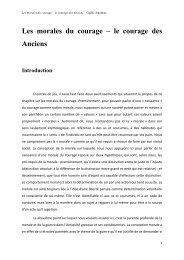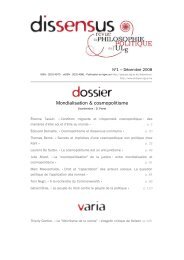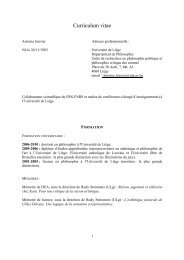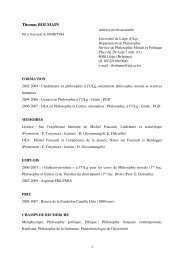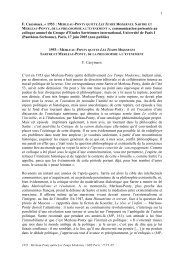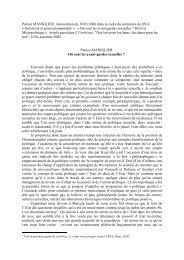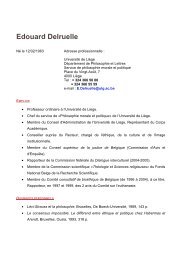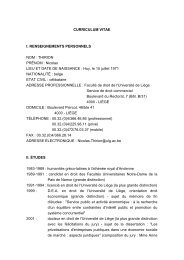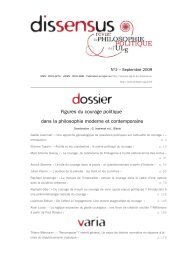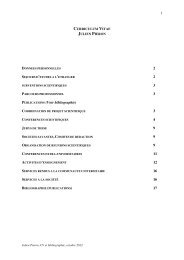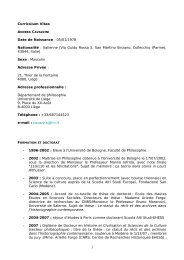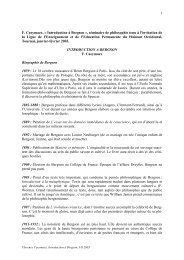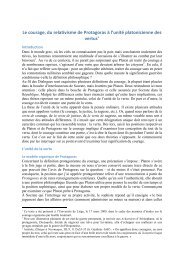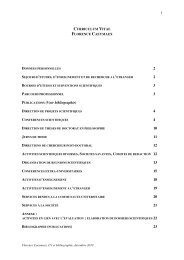Subjectivations politiques et économie des savoirs - Service de ...
Subjectivations politiques et économie des savoirs - Service de ...
Subjectivations politiques et économie des savoirs - Service de ...
Create successful ePaper yourself
Turn your PDF publications into a flip-book with our unique Google optimized e-Paper software.
– Sophie Bourgault: « Prolegomena to a rehabilitation of Platonic mo<strong>de</strong>ration » – p. 127<br />
habits. To be truly mo<strong>de</strong>rate, an individual’s battle against the flesh (so vividly<br />
<strong><strong>de</strong>s</strong>cribed by the likes of Augustine) must not remain a battle. Socrates repeatedly<br />
insists that sophrosyne does not call for a tyranny of reason over the app<strong>et</strong>ites (as the<br />
likes of H. Arendt have suggested), but rather, for a voluntary concord b<strong>et</strong>ween them<br />
(Republic 442d). In the Phaedrus (237e) for instance, we learn that an individual can<br />
be consi<strong>de</strong>red truly mo<strong>de</strong>rate only when her <strong><strong>de</strong>s</strong>ires for pleasures are in harmony with<br />
her acquired judgment. This brings us, in fact, to the second most recurring <strong>de</strong>finition<br />
of mo<strong>de</strong>ration found in Plato’s dialogues: harmony or concord – be it that of a state or<br />
that of a soul. The truly mo<strong>de</strong>rate person is <strong><strong>de</strong>s</strong>cribed by Plato as an individual who has<br />
succee<strong>de</strong>d in relieving the tension b<strong>et</strong>ween his reason, spirit and app<strong>et</strong>ites – he is said<br />
to possess a « kind of consonance and harmony » within his soul (Republic 430e).<br />
Now, how does this second <strong>de</strong>finition (i.e. harmony) relate to the control of app<strong>et</strong>ites<br />
and <strong><strong>de</strong>s</strong>ires? It seems that the latter is subsumed un<strong>de</strong>r the former or, to be more<br />
precise, that self-control serves as a prerequisite for concord: only once we have a<br />
command over our <strong><strong>de</strong>s</strong>ires can we work our way towards true psychic harmony – or,<br />
similarly, civic unity. As we will see further below, the close ties b<strong>et</strong>ween individual<br />
virtue and the city’s happiness are un<strong>de</strong>rscored by the fact that mo<strong>de</strong>ration entails not<br />
only the ability to judge what is an a<strong>de</strong>quate amount of food, power or money to have,<br />
but also the ability to resist the urge to acquire more than that and the tyrannical urge<br />
to acquire more than others.<br />
What I would like to un<strong>de</strong>rscore here is that, contra Ni<strong>et</strong>zsche, the Platonic critique of<br />
intemperance cannot be read as a critique of pleasure qua pleasure or as a call to<br />
abstinence. The Philebus makes it clear that pleasure is an important part of the good<br />
life, and other Platonic dialogues draw, similarly, connections b<strong>et</strong>ween pleasure,<br />
learning and philosophy (e.g. Philebus 21b-23c; Laws 667c ). And, for all the purging<br />
that takes place in the middle books of the Republic, Glaucon will be allowed to keep<br />
his swe<strong>et</strong> relishes (assuming he is still interested in them): citizens of the kallipolis will<br />
not only live on bread and water. In<strong>de</strong>ed, Plato’s un<strong>de</strong>rstanding of what constitutes a<br />
« necessary <strong><strong>de</strong>s</strong>ire » inclu<strong><strong>de</strong>s</strong> <strong>de</strong>licacies that, while not being essential for health or<br />
survival, are <strong>de</strong>emed necessary for well being (Republic 559b). But to say that Plato<br />
approves of pleasure naturally does not mean that for him, all pleasures are created<br />
equal: the gratifications of money-lovers and sex-lovers cannot be said to compare with<br />
those of music-lovers and wisdom-lovers. Moral excellence will require the capacity to<br />
judge what constitutes a pleasure worthy of a good human being. Put most succinctly:<br />
knowledge matters.<br />
In<strong>de</strong>ed, as many scholars have shown, Platonic mo<strong>de</strong>ration entails an important<br />
dimension of cognition and introspection. Mo<strong>de</strong>ration calls for both some knowledge of<br />
what civic life requires in particular circumstances, and an extensive knowledge of the



